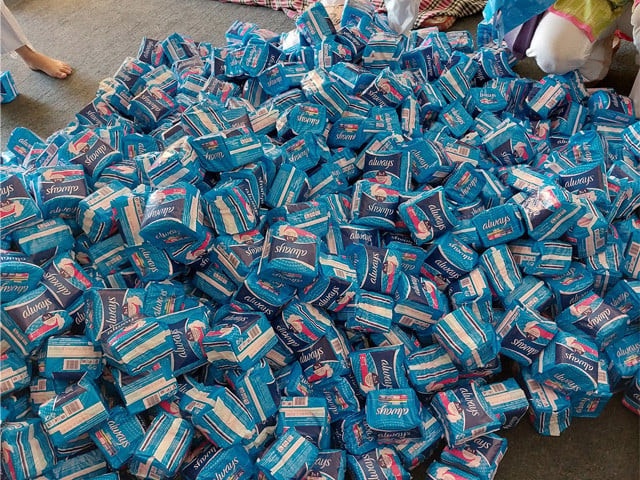One would expect men to be more sensitive at a time like this when majority of our country is under water; hundreds of people have lost their lives and livelihoods and are now vulnerable to life-threatening diseases. It is actually quite reassuring and commendable that multiple various private organisations have managed to collect a considerable amount of donations to provide relief packages to flood survivors. Equally disappointing, however, has been the lack of empathy and support shown to this devastation by the ruling government and political parties, who are supposed to be competent and invested in the betterment and safety of the people they represent so what other civilians and organisations contribute can serve as bonus assistance, and not the only assistance.
The worst floods in the history of Pakistan has showed us how ineffective our state’s preventive measures are, considering natural calamities like floods can very well be controlled to a large extent especially because, according to the Global Climate Risk Index, Pakistan contributes less than 1% to global emissions. Yet, it is among the countries that is being most affected by climate change solely because the country highly lacks the vision and conviction needed to protect its citizens and the country’s infrastructure. Being in power now means stroking old men’s egos and receiving abundant amounts of financial aid from other countries so they can continue to exploit and manipulate the public into thinking they’re doing a lot for them, when practically nothing much has changed since the country gained its independence.
Despite having knowledge of the upcoming weather calamity, there weren’t enough precautions and action taken in a timely manner to evacuate the potentially at-risk areas nor direct families to safe spaces, leading to over 30 million people being displaced during the floods.
While it is devastating to watch heavy floods sweep away everything, it is also important to address how this natural disaster has been extra trying for women, because the fact that climate change impacts women differently can’t be denied. Women are subjected to poor health, violence and inequalities at all stages of a disaster. Furthermore, during a disaster as the one Pakistan is facing currently, women are at an increased risk of gender-based violence, forced marriages and sexual violence, and this cycle of violence does not end here. Psychological affects tend to linger on even after recovery from the disasters and women continue to be at risk of intimate partner violence, especially in rural areas.
According to a report by the United Nations Population Fund (UNFPA), there are almost an estimated 650,000 pregnant women in the flood-affected areas who require maternal health services to ensure a safe pregnancy and childbirth. At least 73,000 women are expected to deliver in September and are in need of skilled birth attendants, new born care and support. There have been several cases of pregnant women giving birth in unsafe places because their houses and nearby hospitals have collapsed with the floods. One example is that of Muridaan Bibi, who gave birth to a baby boy on the roadside next to the rubble that used to be her house in Sindh’s Qambar Shahdadkot. Khairullah, the new born baby, will now have to spend his first day in this world travelling in a truck with his displaced family and their leftover belongings to find a nearby town where his mother can likely see a doctor and recover safely. No child and no mother should have to suffer like this.
Whereas UNFPA and other international aid organisations are working towards providing the necessary equipment and tools to best accommodate women affected during the floods, there are many women who have highlighted the importance of providing sanitary kits for menstruating women. Sanitary napkins (read: pads) are being collected in different areas of Pakistan in order to make sure menstrual hygiene is taken care of.
While women are performing their duty and focusing on what’s important – distributing sanitary kits – we have men questioning the importance of the very same, claiming pads to be a luxury item instead of a necessary one. Some even compared it to providing shaving creams for male survivors.
Today we packed 3000 menstrual products for women affected by floods in Pakistan. @MahwariJustice pic.twitter.com/sglbtsLAwU
— zaakra / sarah’s lover (@zakraaaaa) August 27, 2022
Imagine distributing shaving machines to men in the time of crisis 💀
— Top Gun (@_topgunn) August 27, 2022
Not necessity this is luxury
— Muhammad Uzair🇵🇰❤ (@Uzairpanwar) August 27, 2022
Abe biscuit ka packet zyada important hai pads sey 😭🤣🤣....karna hai toh kuch dhang ka toh karo 🥹🙏
— Johnny Gaddar (@soyabeanchapp) August 27, 2022
It’s clear here that some men are not aware of the basics of a woman’s anatomy. Do they think women will somehow stop bleeding in the middle of all this? Will their bodies halt its natural process to give women a break so they don’t have to deal with cramps and menstruating while they deal with damage from the floods? Do they not know that poor menstrual hygiene makes women prone to more infections and diseases, which can be transferable and contagious? Well, what else can we expect from the male population where sex education is deemed a taboo subject? As if teaching young adults about how the human body works will turn them into sexually-addicted oddities.
Menstruation is a joke for Men in our country. You can see the reaction of some Gandus over sending sanitary pads to women in flood affected areas. When will Desi Men learn about some basics human necessity? People please teach your kids briefly about menstrual cycle too. pic.twitter.com/djxWURgGSA
— Maleeeks (@itsMaleeeks) August 28, 2022
situation where he'd be a woman and not need a pad. He also claimed a woman in that situation would likely want food more than a pad.
— Ammar Anwar (@ammaranwar1996) August 27, 2022
This is what you're not allowed to do. You're not allowed to 'hypothetically be a woman' and say misogynistic and creepy sh*t like this. 2/3 pic.twitter.com/IOHkQLzzvL
It’s dumbfounding the sheer ignorance with which they think it is okay to mansplain to women why menstrual products are non-essential items when they’re not the ones menstruating. There is sadly a vast number of men who are just not sensitised at all about issues that don’t affect their gender, and that in itself is a great example of having ‘male privilege’. Wonder what men would do if they were to stay in temporary housing or relief camps while they bled between their legs. That would be separate havoc to deal with altogether. Not only that, menstruating isn’t just about the bleeding; it has other very real symptoms, including nausea, depression, insomnia, constipation, diarrhoea, severe abdominal pain, backaches and mood swings. To assume that women's natural menstrual cycle will suddenly come to a halt because of the floods is simply too stupid, for a lack of a better word, and to compare it to shaving cream for men is highly offensive and frustrating.
We have reached out to over 7000 women in flood affected areas including:
— Bushra | Period Justice for Flood Victims (@bushramaahnoor) August 29, 2022
Tehsil Paroa, Daraban, Kulachi, Tank, Lasbeela, Sakaro, Noshera feroz, Wang, Dhundi muhammadpur, Hajipur, Aqilpur/Headamad/ Beet sontra, Fazilpur, Lundi sedan,Basti lakha/ basti jageer Gabool, 1/ pic.twitter.com/uAtCl7ennu
The climate crisis is real and dangerous. We no longer have to imagine what it’s like to lose everything because we have already lost it. The longer we continue to deny the effects of climate change and delay our social responsibility to reduce emissions, the more lives that we put in danger. However, the sad reality is that the people who are responsible for creating and being the main catalysts for climate damage are not the ones who will have to face the consequences. Unfortunately, Pakistan is facing one of the worst disasters with no proper direction towards adaptation to climate change, which means there is no solid plan nor means of reducing water usage, adapting healthy diets, introducing sustainable farming, recycling, nor finding greener solutions for our houses. Unless our politicians make the well-being of their people a priority, we will continue to feel the brunt of the blow, and that brunt will always be worse for women.



COMMENTS
Comments are moderated and generally will be posted if they are on-topic and not abusive.
For more information, please see our Comments FAQ